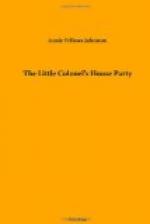I went off to my own room with the letter, and Joyce followed me and found me crying. She made a face out of the window at Eugenia, and told me never to mind what anybody said. There was a big wide world outside of Eugenia’s set with its silly airs and graces, and sensible people made fun of them. Then she offered to illustrate my answer to Davy’s letter, and drew a picture of Calico and Lad at the top of the page, and Lloyd’s parrot at the bottom. That reminded me to tell him some funny things the parrot had said, and in writing them I got over my homesickness.
Eugenia has a crest on her paper, because some one of her great-great-great-grandfathers, almost back to Noah, was a lord. But it doesn’t make her remember to act like a lady. She ought to be made to learn the lines that were in my copy-book once:
“Kind hearts are
more than coronets,
And simple faith
than Norman blood.”
CHAPTER VIII.
THE GYPSY FORTUNE-TELLER.
There had fallen a pause in the round of merry-makings. After a week of picnics and fishing-parties, lawn fetes and tennis tournaments, there came a day for which no special entertainment had been planned. It was a hot morning, and the girls were out under the trees: Betty in the swing, with a book in her lap, as usual, Joyce on a camp-stool near by, making a sketch of her, and Eugenia swinging idly in a hammock.
The Little Colonel had been swinging with her, but something had called her to the house, and a deep silence fell on the little group after her departure. Betty, lost in her book, and Joyce, intent on her sketch, did not seem to notice it, but presently Eugenia sat up in the hammock and gave her pillow an impatient thump.
[Illustration: “’I’M GLAD THAT I DON’T HAVE TO LIVE IN THE COUNTRY THE YEAR ROUND!’”]
“Whew! how deadly stupid it is here!” she exclaimed. “I’m glad that I don’t have to live in the country the year round! Nothing to do—nothing to see—I’d turn to a vegetable in a little while and strike root. I wish something exciting would happen, for I’m bored stiff.”
Betty looked up from her story in astonishment. “Why, I think it is lovely here!” she cried. “I’d never get tired of Locust in a hundred years!”
Eugenia smiled, a pitying, amused sort of smile that brought a flush to Betty’s cheek. There was a tinge of a sneer in it that seemed to say, “Oh, you poor thing, of course you like it. You have never known any better.”
Betty’s eyes went back to her book again. Eugenia, thrusting one little foot from a mass of pink ruffles, gave an impatient push against the ground with the toe of her slipper, which set the hammock to swinging violently.
“Ho-hum!” she yawned, discontently. “I wish that we could go down to the gypsy camp that we passed yesterday.”
“So do I,” agreed Joyce. “It looked so picturesque with the tents and the white covered wagons, and that old crone bending over the camp-fire. I know a woman at home who had her fortune told by a gypsy, and every single thing that was told her came true.”




